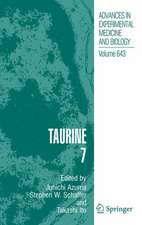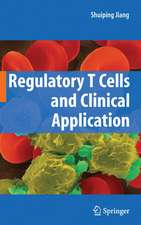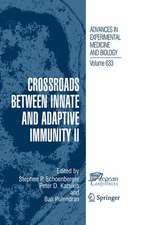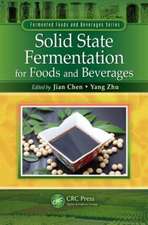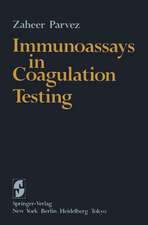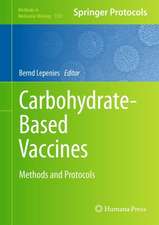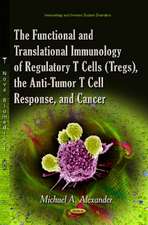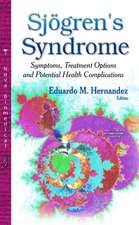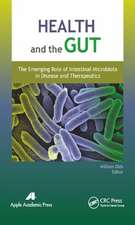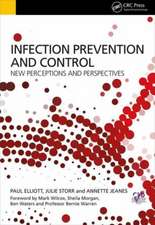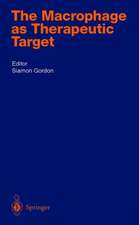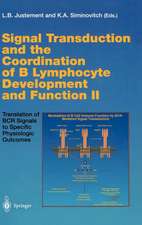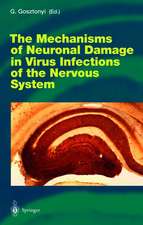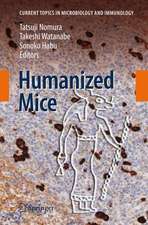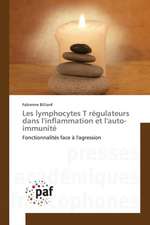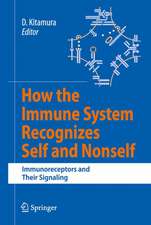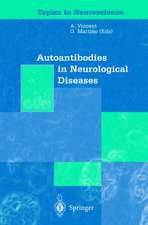Food Allergy: From Molecular Mechanisms to Control Strategies
Autor Linglin Fu, Bobby J. Cherayil, Haining Shi, Yanbo Wang, Yang Zhuen Limba Engleză Hardback – 15 apr 2019
The information provided will enable food scientists/specialists to design safer and more functional food products, and will help regulatory agencies identify and label food allergens (and thus help consumers avoid allergic reactions). It will help clinicians and public health investigators prevent or treat outbreaks of food allergies, and will provide food producers and processors, as well as government inspectors, with valuable insights into evaluation, risk assessment and control strategies for allergens. Lastly, it will benefit upper-level undergraduate and graduate students in food science and safety, public health, medicine, nutrition and related fields.
Preț: 719.02 lei
Preț vechi: 756.86 lei
-5% Nou
Puncte Express: 1079
Preț estimativ în valută:
137.63€ • 149.54$ • 115.68£
137.63€ • 149.54$ • 115.68£
Carte disponibilă
Livrare economică 31 martie-14 aprilie
Preluare comenzi: 021 569.72.76
Specificații
ISBN-13: 9789811369278
ISBN-10: 9811369275
Pagini: 231
Ilustrații: XIII, 216 p. 32 illus., 25 illus. in color.
Dimensiuni: 155 x 235 mm
Greutate: 0.5 kg
Ediția:1st ed. 2019
Editura: Springer Nature Singapore
Colecția Springer
Locul publicării:Singapore, Singapore
ISBN-10: 9811369275
Pagini: 231
Ilustrații: XIII, 216 p. 32 illus., 25 illus. in color.
Dimensiuni: 155 x 235 mm
Greutate: 0.5 kg
Ediția:1st ed. 2019
Editura: Springer Nature Singapore
Colecția Springer
Locul publicării:Singapore, Singapore
Cuprins
Overview of food allergy and gut mucosal immunity.- Species and structure of food allergens: epitopes and cross-reactivity.- Detection and quantification methods for food allergens.- Allergenicity evaluation of food proteins.- Foodprocessing to eliminate food allergens and development of hypoallergenic foods.- Modulation of food allergy by bioactive natural compounds and development of functional foods.- Food allergy and the microbiota: implications for probiotic use in regulating allergic responses.- Intestinal permeability and transport of food allergens.- Risk assessment and control management of food allergens.
Notă biografică
Dr. Linglin Fu is a Professor at the School of Food Science and Biotechnology, Zhejiang Gongshang University.
Dr. Bobby J. Cherayil is an Associate Professor at Harvard Medical School, Mucosal Immunology and Biology Research Center, Massachusetts General Hospital.
Dr. Haining Shi, DVM is an Associate Professor of Pediatrics at Harvard Medical School, Mucosal Immunology and Biology Research Center, Massachusetts General Hospital.
Dr. Yanbo Wang is a Professor at the School of Food Science and Biotechnology, Zhejiang Gongshang University.
Dr. Yang Zhu is a Professor at Wageningen University and Research.
Dr. Bobby J. Cherayil is an Associate Professor at Harvard Medical School, Mucosal Immunology and Biology Research Center, Massachusetts General Hospital.
Dr. Haining Shi, DVM is an Associate Professor of Pediatrics at Harvard Medical School, Mucosal Immunology and Biology Research Center, Massachusetts General Hospital.
Dr. Yanbo Wang is a Professor at the School of Food Science and Biotechnology, Zhejiang Gongshang University.
Dr. Yang Zhu is a Professor at Wageningen University and Research.
Textul de pe ultima copertă
This book addresses the molecular mechanisms of food allergies and related control strategies. To do so, it covers a broad range of topics, including: the basic immunology of food allergies, including crosstalk between gut mucosal immunity and allergens; types of food allergens, structure of food allergen epitopes and cross-reactivity; detection and quantification methods for food allergens; in vitro and in vivo models for evaluating allergenicity; novel food processing methods for the development of hypoallergenic foods; bioactive natural compounds and functional foods for alleviating allergic reactions; modulation of the microbiota in food allergies and use of probiotics in allergic response regulation; and risk assessment and control strategies for food allergens.
The information provided will enable food scientists/specialists to design safer and more functional food products, and will help regulatory agencies identify and label food allergens (and thus help consumers avoid allergic reactions). It will help clinicians and public health investigators prevent or treat outbreaks of food allergies, and will provide food producers and processors, as well as government inspectors, with valuable insights into evaluation, risk assessment and control strategies for allergens. Lastly, it will benefit upper-level undergraduate and graduate students in food science and safety, public health, medicine, nutrition and related fields.
The information provided will enable food scientists/specialists to design safer and more functional food products, and will help regulatory agencies identify and label food allergens (and thus help consumers avoid allergic reactions). It will help clinicians and public health investigators prevent or treat outbreaks of food allergies, and will provide food producers and processors, as well as government inspectors, with valuable insights into evaluation, risk assessment and control strategies for allergens. Lastly, it will benefit upper-level undergraduate and graduate students in food science and safety, public health, medicine, nutrition and related fields.
Caracteristici
Introduces molecular mechanisms of food allergy and its control strategies Covers many topics in the field of food allergy Provides a clear overview of the basics

